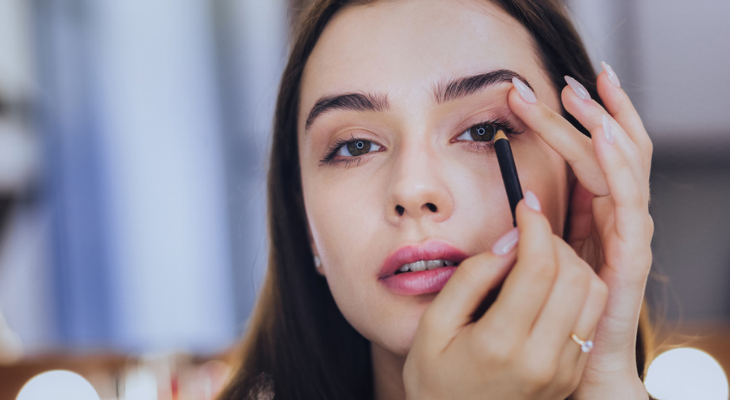
How Eye Makeup Mistakes Can Affect Your Vision
Do you use makeup to accentuate your eyes? Whether your go-to style is a smoky eye or you prefer a more understated look, eye makeup mistakes could increase your risk of eye irritation, infection, or vision loss.
What Types of Eye Problems Can Be Caused by Makeup?
If you're like most people, you probably don't pay much attention to expiration dates on your eye makeup. Unfortunately, as soon as you open a new package of eyeshadow or uncap a tube of mascara, bacteria begin to grow in the product and on the applicator. Replacing makeup every few months is a simple way to avoid bacterial or fungal infections that could cause pain and temporary or permanent vision loss.
Infections can also occur if you don't wash your hands before handling eye makeup, or if an uncovered product becomes contaminated with bacteria, dirt, or dust.
Signs and symptoms of an infection can include pain, redness, discharge, and swollen eyelids. Get in touch with your optometrist right away if you notice any of these symptoms. Without prompt treatment, serious or permanent vision damage could be a possibility.
Have you ever poked yourself in the eye while applying makeup? A poke could cause minor irritation as well as scratch or damage the white part of your eye or your cornea, the clear, rounded tissue that covers your iris and pupil. Scratches can be quite painful, while more serious injuries could put your vision at risk.
The type of eye makeup you use may also cause issues. Eyeshadow that contains glitter or sparkling powder creates a dramatic look but tends to migrate into the eye easily, causing discomfort, irritation, or scratches. The problem can be worsened if you wear this type of makeup with contact lenses. The American Academy of Ophthalmology reports that corneal infections or irritations occur more often in contact lens wearers who wear glitter eye makeup.
What You Can Do to Protect Your Vision
These simple steps can help you avoid eye injuries, irritation, and infection:
- Throw Away Eye Makeup After Three Months: Don't keep eye makeup longer than the expiration date, which is usually about three months. If you develop an eye infection, throw out all of your eye makeup immediately.
- Don't Share Eye Makeup: Sharing your makeup increases your risk of bacterial infection.
- Wash Up Before Applying Eye Makeup: Wash your hands, your eyelids, and your eyelashes before you put on your makeup.
- Don't Continue to Use Eye Makeup That Irritates Your Eyes: You may be allergic to your eye makeup if redness and irritation develop soon after you apply the product. Stop using the makeup, and stay away from other brands of makeup that contain the same ingredients. The American Optometric Association reports that makeup that contains nickel, lead, thallium, selenium, arsenic, cadmium, carmine, and beryllium is more likely to cause allergic reactions.
- Forget About Car Touchups: You're more likely to injure your eye if you apply makeup in a car, train, or another moving vehicle.
- Take Off Eye Makeup Before Sleeping: Eye makeup is more likely to find its way into your eyes if it's worn overnight.
- Keep Eyeliner Off Your Lash Line: Eyeliner applied directly to the lash line can block oil glands that moisturize your eyes, causing dry eye. Applying eyeliner too close to the eye may also increase your risk of irritation or bacterial infection. In a study published in Eye & Contact Lens, researchers discovered that applying glitter eyeliner inside the lash line rather than outside of it resulted in a 15 to 30 percent increase in glitter particles in the tear film.
- Clean Brushes and Applicators Daily: Keeping brushes and applicators clean is a simple way to reduce your risk of infection. It's best to wash applicators and brushes used on or around the eyes after every use.
- Sharpen Eyeliner Before Every Use: Sharpening removes bacteria that can coat the tip of the eyeliner.
- Stay Away from Shared Eye Makeup Samples: Shared samples are overflowing with bacteria. Skip the sample area unless the store offers single-use samples.
- Use Gentle Cleaning Products: Prevent eye irritation by choosing gentle, hypoallergenic makeup remover. Baby shampoo or petroleum jelly make excellent, low-cost cleaners.
Following these makeup safety tips and scheduling regular visits to your optometrist can help you safeguard your vision. Contact our office to make your next appointment.
Sources:
American Academy of Ophthalmology: How To Use Cosmetics Safely Around Your Eyes, 3/24/21
Eye & Contact Lens: Migration of Cosmetic Products into the Tear Film, 9/15
University of Waterloo: Study Finds Eyeliner Application May Cause Eye Problems, 4/1/15
American Optometric Association: Academy Award in Makeup? Not for These Patient Gaffes, 2/9/20
